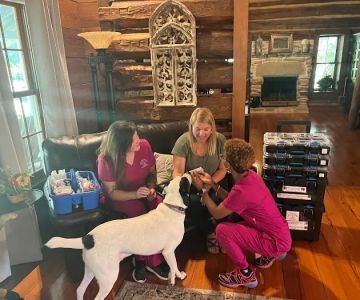What Does It Require to Be a Veterinarian: A Detailed Guide
Have you ever wondered what it takes to become a veterinarian? As someone who's always had a passion for animals, I decided to take a deep dive into the career path of a veterinarian to explore what this journey entails. Becoming a vet is a rewarding but challenging career, and it requires more than just a love for animals. In this article, I’ll walk you through the steps you need to take, the skills you need to develop, and the dedication required to pursue this incredible profession.
1. Educational Requirements for Becoming a Veterinarian
The first and most significant hurdle you’ll face when pursuing a veterinary career is education. As I discovered, veterinary school is competitive and rigorous, and it requires a strong educational foundation. I was surprised to learn that the path to becoming a veterinarian involves more than just undergraduate studies. It’s a multi-step process, starting with the completion of a bachelor’s degree.
1.1 Getting a Bachelor’s Degree
The first step towards becoming a veterinarian is obtaining a bachelor’s degree, typically in a science-related field such as biology, animal science, or chemistry. While some individuals may choose other undergraduate majors, they must ensure they complete the required courses in subjects like biology, chemistry, and physics. During my research, I found that most veterinary schools have specific prerequisites, so it’s crucial to plan your coursework accordingly. If you’re unsure, many universities offer pre-vet programs that guide you on the right track.
1.2 Attending Veterinary School
After obtaining a bachelor’s degree, the next step is attending veterinary school. I was amazed to learn that there are only 30 veterinary schools in the United States, making the application process highly competitive. In addition to excellent academic credentials, applicants must demonstrate relevant experience working with animals, whether through internships, volunteering, or paid positions. Veterinary schools typically require a good score on the GRE (Graduate Record Examination) or other standardized tests, depending on the school. Admission is challenging, and it’s important to build a strong application with recommendations from professors and veterinarians.
2. Skills and Personal Qualities Needed for a Veterinarian
Becoming a successful veterinarian requires more than just academic excellence. Throughout my exploration, I learned that there are specific skills and personal qualities that make a good veterinarian stand out. These traits help you not only in clinical practice but also in managing relationships with pet owners and other professionals.
2.1 Communication Skills
Veterinarians must be effective communicators. Whether they are discussing treatment options with pet owners, explaining complex medical conditions, or coordinating with other professionals, strong communication skills are essential. I found that veterinarians must also have excellent listening skills to understand pet owners’ concerns and provide the best possible care. Effective communication is key to building trust with clients and ensuring their pets receive the best care possible.
2.2 Compassion and Empathy
It’s not just about diagnosing and treating animals; it’s also about showing compassion. Being a veterinarian requires an immense amount of empathy for both the animals and their owners. Whether you’re delivering bad news or performing life-saving procedures, showing kindness and understanding goes a long way in making the experience better for everyone involved. I discovered that the most successful veterinarians have a genuine love for animals and the ability to connect emotionally with their clients.
2.3 Physical Stamina and Dexterity
The physical demands of the profession are often overlooked, but I found that being a veterinarian requires a fair amount of physical stamina. Vets often have to stand for long periods, lift heavy animals, and perform delicate surgeries. Good hand-eye coordination and manual dexterity are essential for performing surgeries and other procedures with precision. It’s a job that demands physical and mental endurance, and it's important to be prepared for the rigorous work environment.
3. Gaining Experience and Specializations
Once you have your veterinary degree, gaining hands-on experience is essential for building a successful career. I discovered that many new veterinarians start their practice by working under the mentorship of more experienced veterinarians. Additionally, pursuing a specialization within veterinary medicine can open up more career opportunities and allow you to work with specific types of animals or medical conditions.
3.1 Internship and Residency
Many veterinarians start by completing internships or residencies in specialized areas such as surgery, dentistry, or oncology. This additional training can take anywhere from one to three years, depending on the specialty. While internships and residencies require a significant time commitment, they provide the opportunity to deepen your knowledge and gain hands-on experience in advanced veterinary care. I found that this is a crucial step for those who want to work in specialized fields like animal surgery or internal medicine.
3.2 Becoming a Specialist
Some veterinarians decide to specialize further by becoming board-certified specialists in areas such as dermatology, cardiology, or radiology. Specializing can lead to higher-paying jobs and greater job satisfaction. I learned that becoming a specialist requires passing rigorous exams and completing years of additional training. However, the payoff is worth it for those passionate about a specific aspect of veterinary care.
4. Continuing Education and Professional Development
The veterinary field is constantly evolving, and it’s important to stay up to date with the latest research, techniques, and technologies. After completing their formal education, veterinarians must engage in continuing education (CE) throughout their careers. This could include attending conferences, workshops, or completing online courses. As I researched the topic, I found that staying current is essential for providing the best care for animals and ensuring professional success.
4.1 Networking and Joining Professional Organizations
Veterinarians benefit greatly from networking with other professionals in the field. Joining organizations like the American Veterinary Medical Association (AVMA) allows veterinarians to connect with peers, access resources, and attend conferences. Networking with other professionals helps you stay informed about industry trends and best practices, which is essential for personal and professional growth.
5. The Rewarding Nature of a Veterinary Career
Becoming a veterinarian is a long and challenging journey, but the rewards are immense. Throughout my research and conversations with veterinarians, I discovered that helping animals and making a difference in their lives is incredibly fulfilling. Whether you're treating pets, working with farm animals, or contributing to wildlife conservation, being a veterinarian provides the opportunity to make a positive impact on both animals and people. While the path to becoming a veterinarian requires hard work, dedication, and a strong educational foundation, the satisfaction of knowing you’re improving lives makes it all worthwhile.











